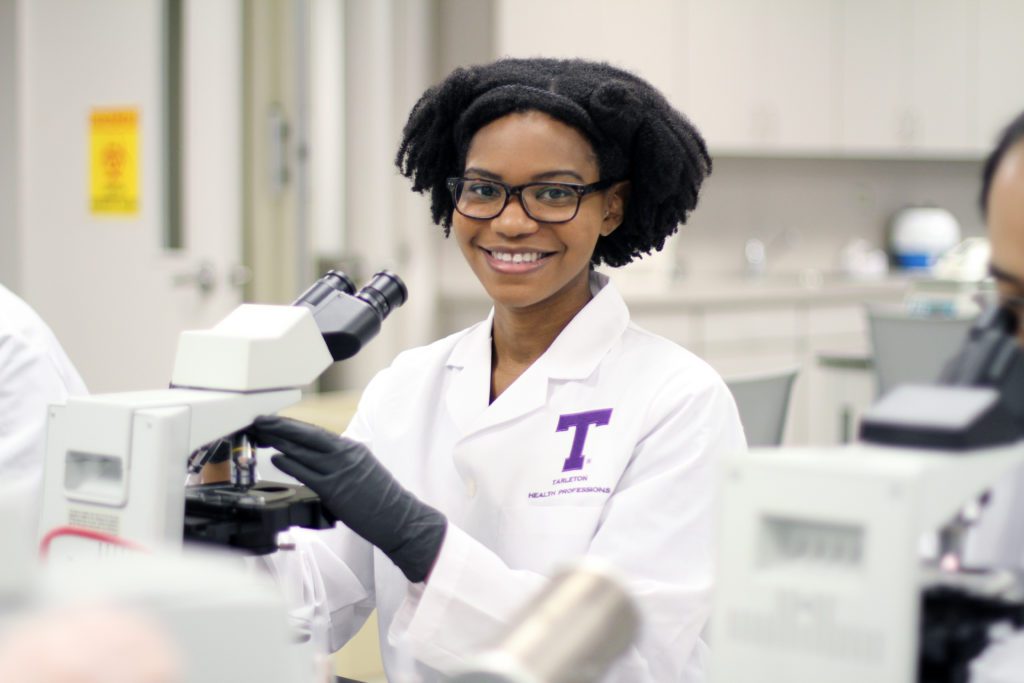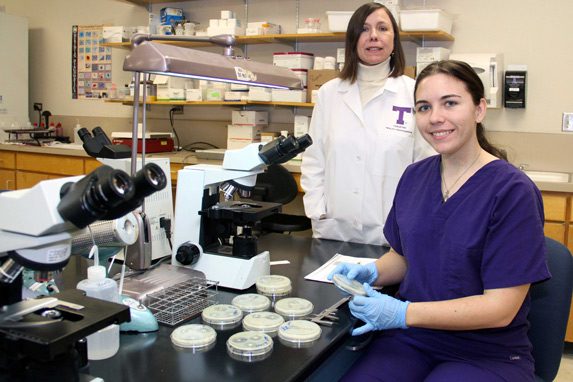B.S. in Biomedical Science
Tarleton Texans know how to focus on life. In the Biomedical Science bachelor’s degree program, we help you focus your studies with relevant coursework and engaging activities that will set you apart in qualifying for professional school programs and future jobs. With an emphasis on hands-on experience in biological techniques and instrumentation used by biologists worldwide, the B.S. in Biomedical Science degree program enables you to gain job-ready training in biotechnology.
The following concentrations are designed to fulfill entrance requirements for medical, dental, pharmaceutical, physical therapy and veterinary programs in Texas and prepare you for entrance exams, such as the MCAT, PCAT, DAT, OAT and GRE.
- General
- Pre-Medical
- Pre-Dental
- Pre-Pharmacy
- Pre-Physical Therapy
- Pre-Veterinary
You may also be interested in a Science Certification or Life Science Certification to teach in secondary schools.
What is Biomedical Science?
Biomedical science combines the fields of biology and medicine for a wide area of study in human and animal health and disease. It encompasses a variety of sub-disciplines ranging from public health and pharmacology to human physiology and genetic engineering. With a major focus on research, biomedical science employs technology, interventions and knowledge to advance the field and improve health in humans and animals.
At Tarleton, we continuously update our program curriculum to keep pace with the rapidly changing field of biomedical science and prepare undergraduate students for real-world situations that may arise in their careers.
What Can You Do With Your Bachelor’s Degree in Biomedical Science?
A biomedical science bachelor’s degree opens up many different career options in professional health and biomedical research, as well as related graduate school programs such as Tarleton’s MS in Biology.

Estimated Completion
120 Credit Hours (4 years)
Application Process
Cost
Locations Available
- Stephenville
- Fort Worth
- Some online courses offered
College
Department
Why Major in Biomedical Science?
With a hands-on approach to learning, we help you develop knowledge, skills and experience through coursework and labs which will prepare you for success in professional or graduate schools.
What Classes Will You Take as a Biomedical Science Major?
Our program curriculum includes a broad range of courses and other learning opportunities to prepare you for a variety of jobs in biomedical science. To help you narrow down your options and plan for the future, a course in Career Pathways in Biomedical Science is built into the curriculum. Other topics for all biomedical science majors, regardless of your concentration, include genetics, animal physiology, plant taxonomy, vaccines, virology and current topics in life sciences. Several courses integrate with the Howard Hughes Medical Institute SEA-PHAGES and SEA-GENES programs for bacteriophage discovery and characterization.
You may also be able to work with an adviser in customizing the program coursework to fit your career goals and interests.
View all required classes for the biomedical science bachelor’s degree.
Accreditations
How Do You Get Started on Your Bachelor’s Degree in Biomedical Sciences?
Take the next step toward earning your bachelor’s degree in biomedical science. We have the resources to help you get started.

Use Modern Biomedical Equipment and Technology
Our classrooms and labs are equipped with thermocyclers, fluorescent microscopes, digital UV and fluorescent spectrophotometers, a DNA sequencer and a fluorescent and luminescent plate reader and imager. We also have advanced cell culture facilities. As a biomedical science major, you’ll study DNA, proteins, cell biology, physiology and bioinformatics. If you’re interested in biomedical research, you can apply to work in our Biosafety Level 2 (BSL-2) laboratories that are






